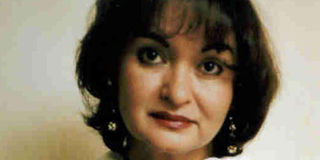Uganda has many gifted writers already - Siddiq

Siddiq believes in this age where writers do not need to plead with publishers, more authors should be producing books in Uganda. PHOTO BY BEATRICE LAMWAKA
East African: Jameela Siddiqi was born in Kenya and grew up in Uganda where she was a student at Makerere University at the time of the Asian Expulsion of 1972. She is a London-based novelist, journalist, broadcaster and Lecturer in Indian Classical Music. She won the Sony Radio Gold Award, (1998) for her series “Songs of the Sufi Mystics”, for BBC World Service Radio. She is the author of two novels based on the Expulsion of Asians from Uganda: The Feast of the Nine Virgins, (2001) and Bombay Gardens (2006). Beatrice Lamwaka exchanged email with her about her passion for writing and Uganda.
What do you remember about growing up in Uganda?
Constant sunshine, greenery, freedom, fields and flowers. Kampala was an exceptionally beautiful city and one never had to think about the weather. I could never imagine living anywhere else. In 1962, I remember the euphoria of independence. My father had just come back from an around-the world tour on a motorbike and declared Uganda the best country in the whole world. Soon after this he took Uganda citizenship for the whole family.
When did you realise you wanted to become a writer?
I didn’t. I never thought about it. I was a television news journalist and always very busy. But, everyday, I sat down and did some writing. One day it turned into a book, The Feast of the Nine Virgins published in 2001 by Bogle L’Ouverture, London.
How has Uganda impacted in your writing?
Whatever we write comes from very deep within us. When I looked at my writing, I realised it’s deeply rooted in childhood. Of course, my childhood and Uganda are inseparable so my writing is always about growing up in Uganda.
What themes/subjects are close to your heart that you must deal with in your writing?
Without a doubt, racism, religious orthodoxy, dictatorships – and music. Everything I write is, ultimately, about music. As I grew up and read more history, I realised that British colonial policy had been specifically designed to separate the Wahindi from the African, because we, as Indians were supposed to serve British interests instead of integrating with the local population. This is a constant theme in my writing.
When do you read?
I only read when I’m not actively writing. Reading and writing do not go too well together for me. When I’m writing fiction, I can only read non-fiction. I love history and science and language/linguistics but my first love will always remain Urdu poetry. And when I’m writing non-fiction – like textbooks on music – then I tend to read a lot of fiction. I like murder mysteries but hate books (or films) about violence.
Which writers cant you get enough of?
My number one is Gopal Bharratam of Singapore. A full time neuro-surgeon, he wrote an astonishing number of novels that I find very hard to put down. I can’t say why, but something in that Singapore psyche really speaks to me. Perhaps it’s the shared colonial/commonwealth experience? He died some years ago. Strangely enough, my novels have also gone down very well in Singapore – although people there hardly know much about Uganda. But they can relate to the colonial thing.
Which writers have inspired you to write?
I have not been inspired by reading a particular writer, life itself has inspired me to write. But there is one writer from Uganda, who encouraged me a great deal to “keep on” – Professor Peter Nazareth of Iowa University, USA, formerly a Civil Servant based in Entebbe. He was in the Expulsion and just like me; he too was a Uganda citizen.
What can Ugandan writers learn from the British literary systems /literature/writing environment?
I am not entirely sure that Ugandan writers need these reference points. There are many enormously gifted writers in Uganda. What East Africa lacks is a vibrant publishing scene.
I’m tired of trying to persuade Ugandan publishers to make my books available to East Africans. But, in this day and age, writers don’t need publishers.
Anybody can publish on the internet – or put out e-books and directly reach their readers. If reaching readers is more important than making money, then there is always a way to become a writer and cut out the middle-man – the publisher.
But reviewers are a pain. They refuse to review anything that has not come via a traditional dead-tree book publisher. So one should also bypass these reviewers and find other ways of getting a book reviewed and objectively assessed.
What can the Ugandan government do to create conducive environment for writers?
I think the Ugandan government could take a look at the lack of good quality publishers in the country. A government press could encourage new writing from Uganda. It’s all a case of whether a government thinks home-grown talent is important or whether it prefers its population to consume foreign rubbish being dumped on the market. Makerere University should have its own Press for Literary Fiction and other kinds of books.
What are you working on?
Several things – all at once, as usual. I always have a novel in progress, but I continue with my paid freelance work at the same time. I don’t believe in pressure where fiction is concerned. Writing fiction is very much like making pickle – it needs to sit and mature.
Believe me, it definitely gets better with waiting a bit. A book tells you when it is done. As you write that final line, you know you have reached the end.




